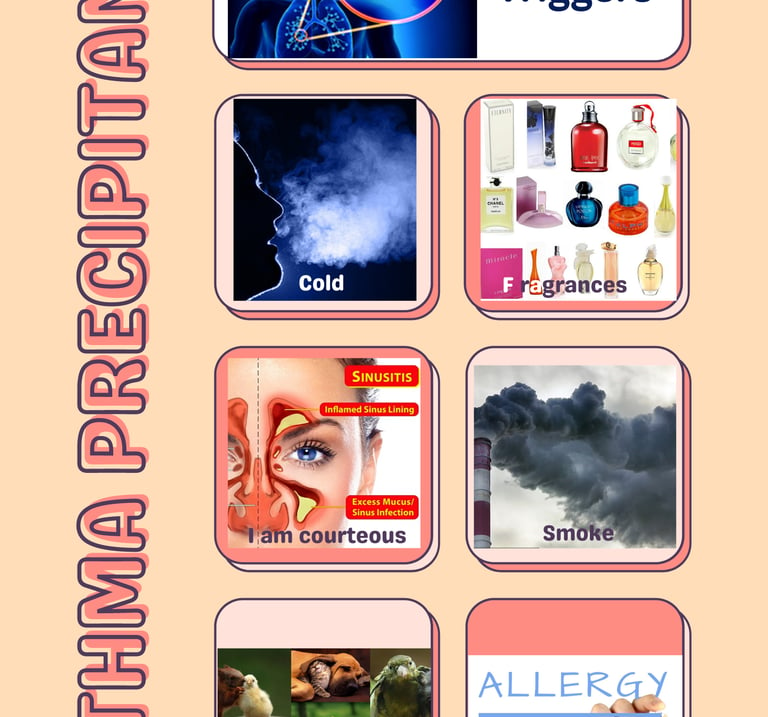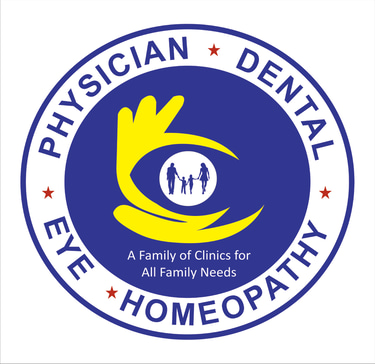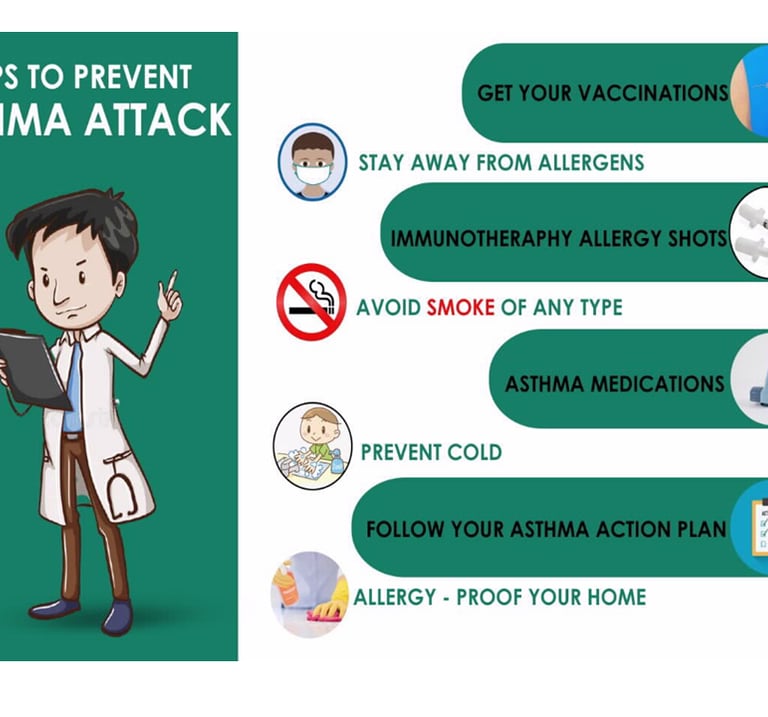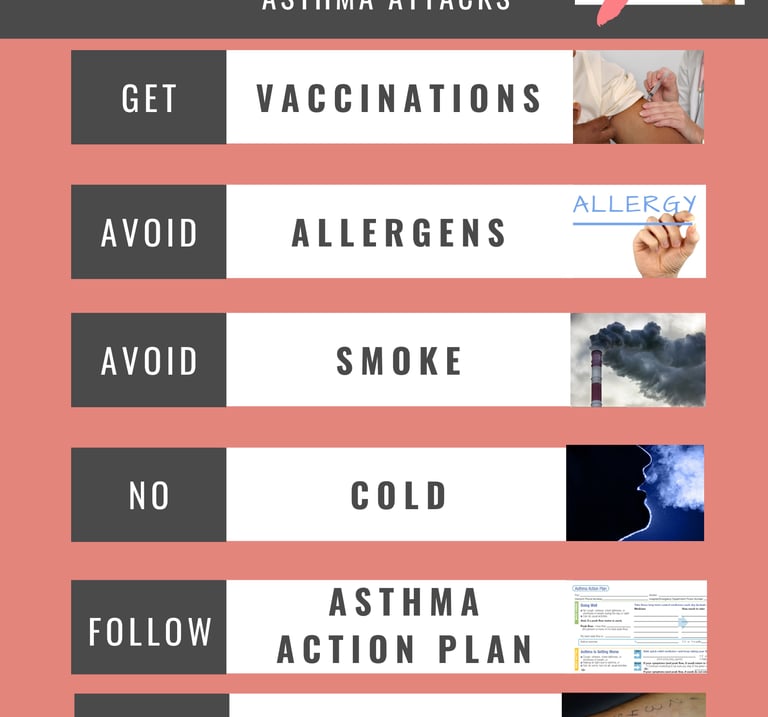Asthma Care in Winters
Asthma Care winters medicines triggers
PHYSICIAN
With winters setting in, seasonal Asthma is expected to rise. With pollution to rise in the coming few weeks, symptoms of Asthma and other COPD are expected to heighten the severity. If you have asthma, you can cut down your exposure to asthma triggers. Asthma triggers can aggravate your symptoms -- coughing, wheezing, and having a hard time catching your breath and sometimes even chest pain. It’s essential to bring Asthma in control to prevent respiratory illness and decrease in quality of life.
Experienced physician at My Physician’s Clinic @ My Family Clinics Faridabad Dr HP Singh reiterates more care to be taken especially when the weather is changing or winters are approaching more so in the festive season of Diwali. The following steps help to control Asthma:
1. Identify stuff that triggers Asthma
Certain asthma triggers can set off a cascade of asthma symptoms. These include:
• Air pollution
• Allergies
• Cold air
• A cold or flu virus
• Sinusitis
• Smoke
• Fragrance
So to by avoiding triggers such as tobacco smoke or using appropriate masks, Asthma severity can be decreased.
It’s vital to learn to identify your asthma triggers and take steps to avoid them. Keep track of your symptoms in an asthma diary for several weeks. Detail all the environmental and emotional things that affect your asthma. Even commonly used medicines like Aspirin can induce Asthma. When you have an asthma attack, check the diary to see which thing, or combination of things, might have led to it. Some common asthma triggers, like moulds and cockroaches, aren’t always obvious.
If you have exercise-induced asthma, are planning a heavy workout, or plan to exercise in cold, humid, or dry air, take steps to prevent an asthma attack. Follow your doctor's advice on asthma treatment.
2. Stay Away From Allergens
If you have allergies and asthma, it’s important to keep your distance from allergens (things you’re allergic to). Allergen exposure can increase the inflammation in your airways (Asthmatic lungs have swollen respiratory tract with excessive mucous) for a while, making an attack more likely. Dr HP Singh encourages getting in touch with your physician to understand allergy testing and identification of the allergen, you respond to. You then take steps to avoid them or get desensitized. Also, check if you can be desensitized to allergens.
3. Avoid Smoke of Any Type
Smoke and asthma are a bad mix. Limit exposure to all sources of smoke, including tobacco, incense, candles, fires, and fireworks. Don’t allow smoking in your home or car, and avoid public places that permit it. If you smoke cigarettes, get help to quit. Smoking always makes asthma worse. Following association help in discovering smoke.
4. Prevent Colds
Do what you can to stay well. Avoid close contact with people who have a cold or the flu, because catching it will make your asthma symptoms worse. Wash your hands well if you handle items that someone with a respiratory infection may have touched. Moreover, to prevent yourself from the flu, you can get flu shots.
5. Allergy-Proof Your Home
Whether you’re at home, work, or travelling, there are things you can do to allergy-proof your environment and lower your chances of an asthma attack. Don’t eat in restaurants that are smoky or allow cigarette smoking. If you can, bring your own bedding and pillows in case the hotel only supplies feather pillows and down comforters. They can house dust mites and cause asthma symptoms. Vacuum cleaning can be of great help.
6. Get Your Vaccinations
Get a flu shot every year to protect against the flu virus, which can worsen your asthma for days or weeks. Asthma makes you more likely to have complications from the flu, like pneumonia, and to be hospitalized because of it. You also have a higher chance of getting pneumococcal pneumonia, a common type of bacterial pneumonia. Asthmatics are not only at higher risk of respiratory tract infection but also hospitalization and ICU stages. The vaccine of pneumococcal for pneumonia and brain infections are of great benefit. And you need a TDAP vaccine to protect you against tetanus, diphtheria, and whooping cough, along with a zoster vaccine to keep you safe from shingles.
7. Consider Immunotherapy Allergy Shots
If your doctor finds that you have allergies, allergy shots may help prevent allergy symptoms and keep your asthma from getting worse. With allergy shots, the doctor injects small doses of allergens under your skin on a regular schedule. Over time, your body may get used to the allergen and respond less when you’re exposed. This can help keep your asthma under control.
8. Take Asthma Medications as Prescribed
Long-term asthma medications are designed to prevent symptoms and attacks. You need to take them every day, even if you don’t have symptoms. They’ll ease inflammation in your airways and keep your asthma under control, so it’s less likely to flare up. If side effects bother you, talk to your doctor about switching to another treatment. Prepare an emergency kit, emergency card and picture of the card.
9. Follow Your Asthma Action Plan
Take your meds, even when you feel OK. If you notice symptoms, check your plan for instructions on what medications to take. During an attack, the plan can tell you what meds will help and when it’s time to call the doctor.
To know more about it, you can definitely seek our assistance with the best hospital for Asthma in Delhi NCR. Call us at +91-8860888886 or visit us at www.myfamilyclinics.com






